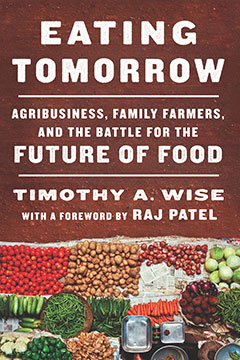 Eating Tomorrow: Agribusiness, Family Farmers, and the Battle for the Future of Food, © 2019 by Timothy A. Wise. Used by permission from the publisher, The New Press, thenewpress.com.
Eating Tomorrow: Agribusiness, Family Farmers, and the Battle for the Future of Food, © 2019 by Timothy A. Wise. Used by permission from the publisher, The New Press, thenewpress.com.
Timothy A. Wise, Small Planet Institute
Introduction
In Mozambique’s lovely capital city of Maputo, the afternoon temperature had just hit 104 degrees Fahrenheit. Maputo is in the tropics, but this was October 2017, its springtime, and no one could remember a hotter October day. Inside the air-conditioned Radisson Blu Hotel on the city’s waterfront, African government representatives and international experts gathered for the African Union’s annual agricultural research conference. Organized by the Washington-based International Food Policy Research Institute, these conferences have monitored and supported African governments’ ambitious commitments since 2006 to invest in agricultural development. Well- dressed participants sipped bottled water and took on the theme for this year’s conference: “Climate-Smart Agriculture.”
The day before, I’d been with farmers in Marracuene, just forty-five minutes up the coast from Maputo. They weren’t embracing the experts’ climate-smart initiatives but rather defending themselves from them. They wanted no part of synthetic fertilizer, which was labeled climate-smart even though it came from fossil fuels. Small-scale family farmers often referred to such practices, and the “technology package” of which they were a part, as “climate-stupid agriculture.”
In Southern Africa, there is nothing abstract about climate change. In the unseasonable spring heat, the women of Marracuene told me of the climate roller coaster they had been riding the last few years. They had seen their rainy seasons turn erratic and undependable, shortening the growing season. They’d seen unusually frequent and intense storms bring floods through their well-tended fields, washing away seeds, crops, and topsoil. They had suffered two consecutive years of drought, worsening the cyclical El Niño weather pattern that wreaks havoc with farmers. In those droughts, they had sweltered in heat waves they said were unprecedented, with temperatures climbing out of the nineties to 100 degrees Fahrenheit, then 106. In 2017, the thermometer hit 110 and crops baked to a crisp in the parched fields. Blessed with irrigation that allows them a second crop in the dry season, they had even seen that backfire on them. In the 2015 drought, the Incomati River, which fills their irrigation ditches with water, saw water levels so low that the Indian Ocean, four miles downriver and swollen with rising sea levels, flowed back up the dried riverbed. Irrigation canals in parts of the region filled with salt water, destroying crops and land.
The women who lead Marracuene’s 7,000-member farmer associations seemed undaunted. They had their own climate adaptation strategies, and those did not involve using more fossil fuels or growing monocultures of commercial seeds. They had improved their own preferred vitamin-rich, drought-tolerant maize variety. They had created seed banks that saved the day when climate calamities wiped out many farmers’ maize and with it the next year’s seeds. Their steady intercropping, with diverse food crops growing within the same field, was improving their soils as it fed their families, with drought-tolerant crops—cassava, cowpeas, sweet potatoes, okra—preventing a food crisis when the maize crop failed. Their rich soil now retained moisture when rains were poor and better absorbed the downpours. These farm families were eating today, despite the damaging climate, and they were steadily improving their chances of eating tomorrow by enriching rather than depleting the resource base that gives them their sustenance.
They were getting no significant help from their government or from the international agencies gathered in the Radisson Blu air-conditioning to address global warming. Neither were family farmers in other parts of Africa. Instead, they were being pressured to abandon their native seeds in favor of commercial varieties or, worse still, genetically modified seeds; to give up the crop diversity that provides them diet diversity in favor of intensified monocultures of maize or other cereal crops; and to shortcut their patient soil-building practices, substituting expensive, fossil-fuel-based fertilizer for their own homemade compost. Family farmers in the developing world know they will never grow crops like farmers do in Iowa, and mostly they don’t want to. But that is the path that their governments and the Western donors and philanthropists who back them are insisting poor farmers follow.
Going from Marracuene’s farmers to the policy-maker conference in the Radisson Blu, I saw the kind of disconnect I’d seen repeatedly in the ten years since food prices spiked, food riots broke out in many developing countries, and African leaders decided they needed to grow more of their own food.
Most of the climate-smart initiatives being hailed at the conference as “win-win” solutions, I realized, had only one consistent winner: agribusiness, the conglomerates that dominate the production of seeds, fertilizers, and other farm inputs. There, as elsewhere in the various halls of power, farmer initiatives that grew more food while reducing dependence on multinational agribusiness were marginalized in favor of business-friendly programs that boosted corporations’ profits, increased corporate control of our food systems, and deepened farmers’ dependence while undermining the very resource base on which they—and the hungry world—depend for food.
That is why I decided to write this book. I needed to understand why our leaders, after the wake-up call of a global food crisis, remained so blindly committed to business-as-usual policies that ignored the affordable solutions all around them. These solutions could help hungry farmers eat today while giving them the natural and financial resources that could allow them—and all of us—to eat tomorrow.
Teaser photo credit: By Diksha41 – Own work, CC BY-SA 3.0





